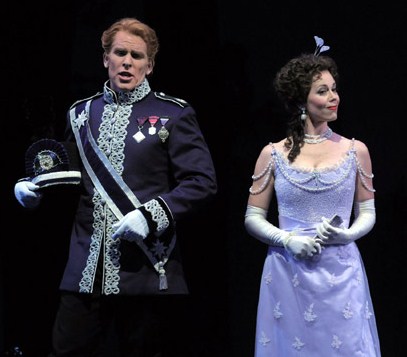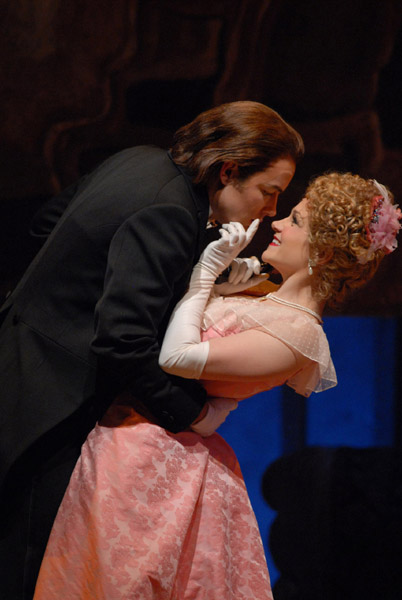With its flaws, Lyric Opera’s lively “Merry Widow” pops the vocal cork successfully

Beyond the holiday season and the operetta’s frothy high spirits, there was extra reason to be celebrating at the Lyric Opera of Chicago’s opening performance of Lehar’s The Merry Widow Saturday night.
The long-simmering contract dispute with the Lyric Opera Orchestra musicians was settled late Thursday night, averting a planned strike for Saturday that would have heaped black coal into everyone’s Christmas stockings at the Civic Opera House.
With that crisis averted, all seemed eager to get back to business, with the Lyric musicians launching into the brassy introduction Saturday night with an extra degree of panache and swagger.
For all its popularity, Franz Lehar’s operetta is a difficult work to pull off. With reams of dialogue, keeping the balance between the music and the sly verbal sparring between former lovers, the rakish Count Danilo and the newly enriched young widow Hanna Glawari, is no easy task.
The crucial element that gets lost in most stateside productions is the melancholy beneath the operetta’s surface frivolity. When Die lustige Witwe premiered in Vienna in 1905, the Austro-Hungarian Empire’s decline had already begun, and there is a sadness and bittersweet nostalgia in The Merry Widow for a glorious past, which is largely foreign to most American stagings.
The Lyric’s new production could have used more of that darker undertow. Also the company elected to perform The Merry Widow in English, the current trend in opera houses, but that’s a double-edged sword. For all its sophistication, the original libretto hasn’t held up well, a problem that is mitigated somewhat by distance when performed in German. Sheldon Harnick’s translation fits words to music deftly but feels tired and dated with three clinkers (the endlessly repeated “That’s the long and short of it”) for every genuinely funny line.
Yet it is Lehar’s glorious score with its Hungarian dances, boisterous ensembles and famously indelible waltz that brings the crowds into the theater, and, on the vocal front, the Lyric’s new production is a resounding success.
Elizabeth Futral is at the right stage in her career for the role of the young, elegant Petrovenian (read Hungarian) widow whose riches are being pursued by her admiring countrymen to fill their overspending nation’s empty coffers. The Lyric favorite looked beautiful and sang radiantly with a nuanced, lovingly expressive Vilja, as well as entering fully into the ensemble dancing and hijinks.
Futral was less successful inhabiting the character of Hanna. There’s a certain light charm and continental refinement needed for this role, and the soprano was all too earnestly American, her spoken dialogue replete with flat whiny vowels and overemphatic punchlines.
As the Maxim’s-loving Danilo, Roger Honeywell was ideal in both characterization and vocalism. The Canadian tenor’s flexible voice is well-suited to Lehar’s buoyant score and he delivered warmly idiomatic singing in the operetta’s set pieces. Honeywell also managed the farce and dialogue with a theater hand’s natural ease, making a well-rounded character out the pleasure-loving, commitmentphobe playboy who has met his match in the hard-to-get Hanna. The tenor seemed to having a high time, throwing himself into the ensembles and dancing with an energy that was infectious.

As the second, would-be adulterous couple, Andriana Chuchman and Stephen Costello were a worthy duo. Chuchman’s Valencienne was more Midwestern than Parisian, but the Ryan Center member sang with lustrous tone as Baron Zeta’s wandering wife. The Canadian soprano also showed her versatility, bringing impressive agility to her dance number with the Grisettes (how many conservatory-trained opera singers are there who can do a floor split?). Well cast as the dashing Camille de Rosillon, tenor Stephen Costello made an admirable Lyric debut as Valencienne’s beau, some strenuous top notes in their duets apart.
Dale Travis was a superb Baron Zeta, aptly blustery and befuddled, making every punchline count. As the various Petrovenian officials and Hanna admirers, David Portillo, Paul La Rosa, Larry Adams, James Rank and Bernie Yvon contributed their part, while Jeff Dumas was a genuinely amusing vestpocket Njegus.
The new production by Daniel Ostling offered an elegant silver-blue set for the Petrovenian Paris embassy, yet looked a bit bare and cost-effective with a long curved staircase, two round seating couches and a small chandelier, the monotony broken up by quick scenic drops. Hanna’s garden soiree was more evocative, the moonlit nocturnal atmosphere well lit by Christine Binder. Most striking was the multi-tiered final tableau at Maxim’s with a rotating stage set for the Grisettes, and ample onstage tables for its audience. The production’s most inspired visual is a subtle scenic throwaway, with a top level of Maxim regulars arranged and lit in a ghostly green, evoking Toulouse-Lautrec’s At the Moulin Rouge.
Gary Griffin, associate artistic director of Chicago Shakespeare Theater, made a largely impressive Lyric directorial debut. Griffin brought a nicely judged blend of spontaneity and restraint, avoiding knockabout overkill and drawing fine performances and graceful movements from his hard-working cast. But why in the world at the climactic moment of the operetta, would you have all the other couples dancing the famous waltz around them while Danilo and Hanna merely watch? Bizarre.
Conductor Emmanuel Villaume elicited playing of idiomatic vitality and brassy bravado, a deadly slow tempo for Vilja apart. Donald Nally’s chorus sang with superb commitment and dynamism. Daniel Pelzig’s choreography was energetic if not without its campy moments, though the audience clearly enjoyed Danilo and the boys’ chorus line routine in their paean to women.
Some audience members complained at intermission about voices being inaudible but I found the tricky switching between discreetly amplified dialogue and unmiked singing largely unobtrusive and skillfully handled.
The Merry Widow runs through January 16. www.lyricopera.org; 312-332-2244.
Posted in Performances





Posted Dec 07, 2009 at 8:23 am by Hank Browne
Once again I must commend the beautiful writing in this review. Unfortunately I have the series I will call Mason’s Revenge and will not see this production until more than a month after its opening.
But I did hear the broadcast and suggest that the soaring soprano of Adriana Chuchman (no “R”) was glorious. I have followed this Ryan soprano since her arrival and predict a superstar has arrived among us.
Conductors that Ive heard speaking are glowing in their praise of the orchestra. Think about trying to transition from Gounod to Czech Katya and then having to play an Austrian waltz in the same week. It takes superlative musicianship to accomplish those distinct styles–all at the same time you had to have wondered if you will get a check next week.
Roger Honeywell’s Danilo sounded way too buffo for me, but once again I will reserve final judgment until Jan 9, 2010.
Ms Futral is unquestionably a superb musician with a beautiful voice to match her physical attributes but does seem to have a certain shyness that contrasts markedly with her amazing musical versatility. I wish I had seen her in the last Traviata instead of the incompetent Fleming in that particular role.